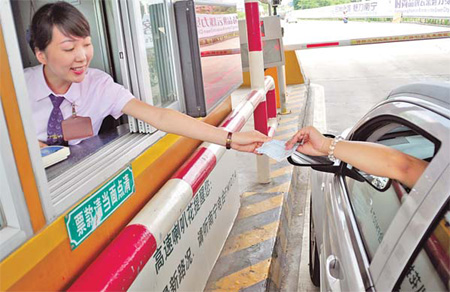Society
Tollway system on target list
By Xin Dingding (China Daily)
Updated: 2011-06-21 07:46
 |
Large Medium Small |
|
 A worker at a tollgate on a highway linking Guilin and Beihai cities in South China's Guangxi Zhuang autonomous region gives receipts to a driver on Monday. [Photo / Xinhua] |
Expressway tolls remain long after construction costs have been repaid
BEIJING - A campaign targeting illegal toll collections started on Monday amid rising criticism of the country's tollway system.
The year-long campaign will take down unauthorized tollbooths and close those that collect tolls after the authorized period has concluded.
|
||||
The departments include the Ministry of Transport, which is in charge of road transport, the National Development and Reform Commission (NDRC), which controls pricing, and the Ministry of Finance, which is in charge of funds.
The Ministry of Supervision and the State Council office for rectifying malpractices are also part of the campaign to ascertain where responsibility lies.
During the period, local governments will suspend listing toll roads for funding and suspend overseas companies buying assets of State-owned toll roads.
According to the work arrangement, the five government bodies will carry out investigations from now to the end of August.
Local governments will then be given time to introduce reforms themselves between September and December.
Next year the government departments will send teams to check the results and help local governments make corrections.
"We will take measures to make sure the campaign is not carried out superficially," Minister of Transport Li Shenglin said at a televised meeting last Tuesday.
It is not the first time that government bodies have tried to clean up the mess in the country's tollway system.
Since 1994, government departments including the transport and public security ministries have been fighting the unauthorized establishment of tollbooths, unjustified charges and arbitrary penalties.
But previous efforts failed to solve the problems. Media reports said that some local governments set up several tollgates over a short distance, and others had approved extending toll collection periods beyond the period when the costs and loans had been paid off.
A widely criticized example is the expressway heading to the Beijing Capital International Airport. The expressway was completed in 1993 with an investment of 1.165 billion yuan ($180 million), including loans of 765 million yuan.
By 2005, the expressway had collected 3.2 billion yuan in tolls. But the Beijing municipal government decided in 1997, three years after the road started collecting tolls, that the expressway could collect tolls until 2022. It is estimated that the road could collect 9 billion yuan more from 2005 to 2022.
Liu Kaixiang, a law professor at Peking University, said that expressways have become cash printers for local governments, which is why solving the problems with toll roads has been so difficult.
In China, expressway companies collecting tolls are directly linked to local governments. An investigative report by Nanfang Weekly showed that many board members at the 19 listed expressway companies are government officials from local transport departments.
In other words, local transport departments not only benefit from collecting tolls, but also decide on the amount of the tolls and how long an expressway company can collect them.
This fact made many experts pessimistic about the effectiveness of this campaign. Wu Wenhua, deputy director of the comprehensive transport institute with NDRC, said the campaign will intensify the "game-play" between central and local governments.
| 分享按钮 |
